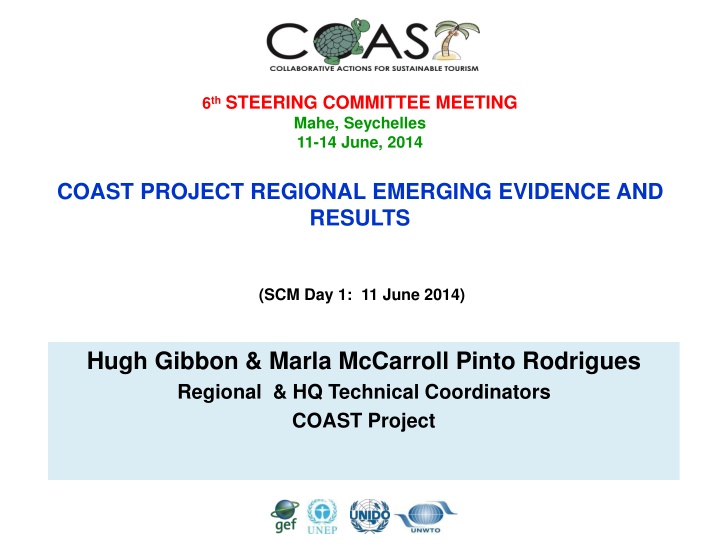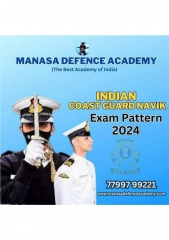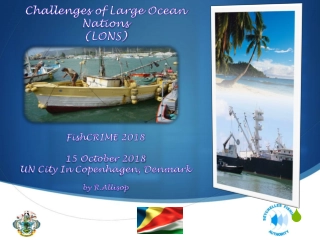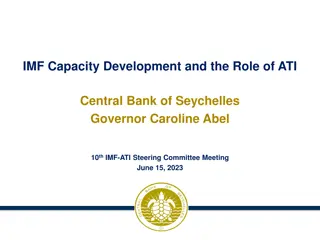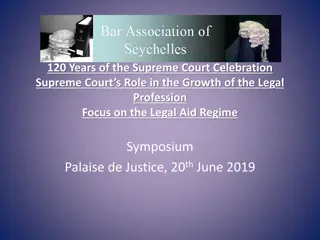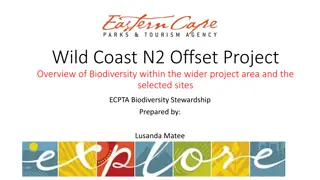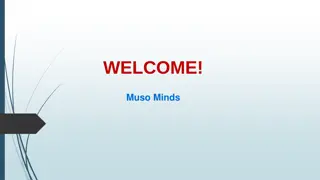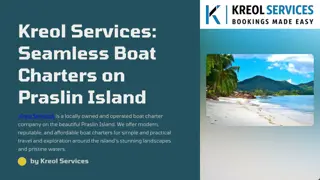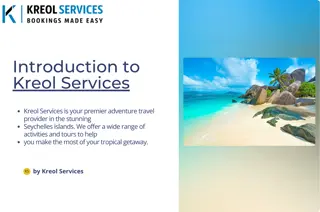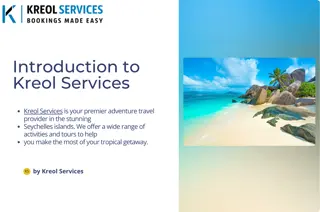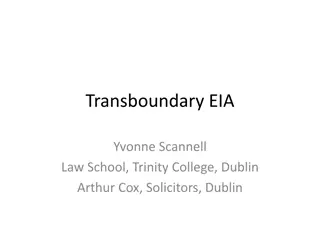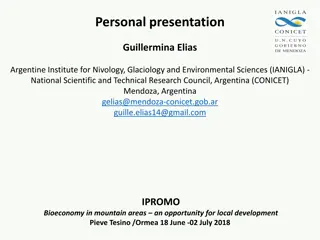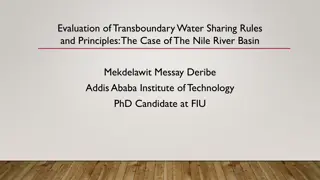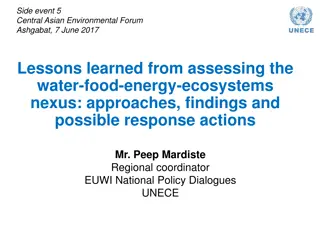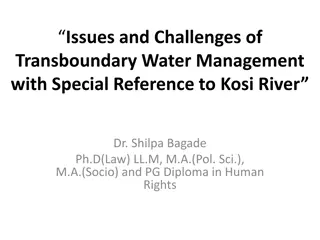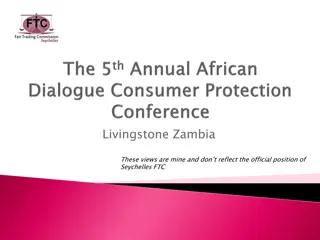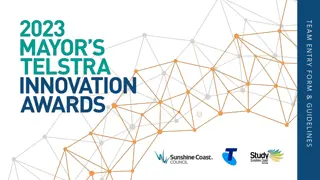Transboundary Lessons from the COAST Project in Seychelles
The COAST Project aims to promote sustainable tourism practices to protect marine and coastal environments. Through the documentation of Best Available Practices (BAPs) and Best Appropriate Technologies (BATs) at transboundary sites, the project emphasizes the importance of cleaner management techniques in the African hospitality industry and community-based economic initiatives for poverty reduction. Partner hotels have shown improved economic performance and environmental sustainability through collaboration with UNIDO and local stakeholders. This presentation highlights key evidence and outcomes from the project's efforts in Seychelles.
Download Presentation

Please find below an Image/Link to download the presentation.
The content on the website is provided AS IS for your information and personal use only. It may not be sold, licensed, or shared on other websites without obtaining consent from the author.If you encounter any issues during the download, it is possible that the publisher has removed the file from their server.
You are allowed to download the files provided on this website for personal or commercial use, subject to the condition that they are used lawfully. All files are the property of their respective owners.
The content on the website is provided AS IS for your information and personal use only. It may not be sold, licensed, or shared on other websites without obtaining consent from the author.
E N D
Presentation Transcript
6thSTEERING COMMITTEE MEETING Mahe, Seychelles 11-14 June, 2014 COAST PROJECT REGIONAL EMERGING EVIDENCE AND RESULTS (SCM Day 1: 11 June 2014) Hugh Gibbon & Marla McCarroll Pinto Rodrigues Regional & HQ Technical Coordinators COAST Project
DEMONSTRATION AND DOCUMENTATION OF RESULTS The goal of the COAST Project is to Demonstrate and support the adoption of best practices for sustainable tourism to reduce the degradation of marine and coastal environments of trans-boundary significance. The COAST Project has dedicated additional efforts during the last year of implementation to capture and document BATs/BAPs arising from the demo sites which can be used to facilitate replication, upscaling, and sustainability of actions at a national and regional level. These BAPs/BATs have been documented both at a country level and at a trans-boundary level. This presentation emphasizes some of the main transboundary lessons to inspire discussion among partner countries.
MAJOR TRANSBOUNDARY EVIDENCE #1 Adopting cleaner management techniques and technologies in the African hospitality industry can help hotels gain a competitive edge and achieve a healthier environment.
MAJOR TRANSBOUNDARY EVIDENCE #1 In cooperation with the private sector, partner hotels have improved their economic performance, controlled costs and gained competitive edge through the adoption of solutions underUNIDO s TEST methodology in partnership with local NCPCs, consultants , community groups and public sector. The results demonstrate improved prospects for the coastal tourism through balancing social, economic and environmental management components. Example from the ground: Saly hotels used TEST to cut unnecessary expenditure in a challenging pricing market
MAJOR TRANSBOUNDARY EVIDENCE #2 The goals of poverty reduction and job creation can be achieved through the promotion of community based entrepreneurs involved in activities related to the conservation of natural resources.
MAJOR TRANSBOUNDARY EVIDENCE #2 Demand related to tourism provide a great opportunity to create SMEs or income generating activities involving the poor. Community based economic initiatives may have varying structures depending on specific sites. They may include both private and public sectors as well. They can also be excellent partners for local and national tourism administrations to engage with in the sustainable management of a destination. Example from the ground: In Kartong and Ada, tourism stakeholders associations have been created and provide business opportunities to locals, while at the same time they have created interesting tourism activities
MAJOR TRANSBOUNDARY EVIDENCE #3 Local tourism stakeholders can play a leading role in the conservation of biodiversity in coastal tourism destinations.
MAJOR TRANSBOUNDARY EVIDENCE #3 Stakeholders in the tourism sector can become nature protection leaders. Diverse mechanisms have been demonstrated in the COAST project where tourism stakeholders have engaged in activities such as: mangrove regeneration, beach forestation, support to marine conservation and improved waste management. Three Biodiversity champions trainings organized by UNWTO in The Gambia, Tanzania and Ghana with positive impact. Example from the ground: In Ada, turtle tours provide the Ghana Wildlife Service an opportunity to obtain local economic benefits while fostering engagement in wildlife conservation
MAJOR TRANSBOUNDARY EVIDENCE #4 Private/community/public partnerships enable the development of new environmental services and economic activities and improve local management of the coastal zone.
MAJOR TRANSBOUNDARY EVIDENCE #4 Hospitality industries are a major producer of waste in many coastal destinations. Demo sites like Ghana, Senegal and Kenya have developed community public and private sector partnerships using the ST-EP and TEST methodologies to enhance emerging economic activities related to waste management and recycling. Example from the ground: A recycling facility in Watamu enables recycling of inorganic/plastic waste generated by hotels as well as from the beaches, providing incentives for better environmental management of beach areas and improved local economy .
MAJOR TRANSBOUNDARY EVIDENCE #5 Planning in coastal areas must be understood as an integrated and dynamic process, requiring the coordination of various activities within the same space (e.g. tourism, fisheries, transport, industry) anticipating both present and future environmental pressures.
MAJOR TRANSBOUNDARY EVIDENCE #5 In coastal areas various activities have to co-exist within a limited space. Conflicts on land uses among investment actors/tourism developers/communities are common. The level of local development (reflecting access to basic needs) may be low while poverty levels remain high. Coastal areas present rich and sensitive ecosystems on which local communities may be very dependant. Coastal destinations are also highly vulnerable to climate change. Example from the ground: In Saly and Watamu improved shore management actions supported by the COAST project have contributed to enforcing participatory and integrated planning practices .
MAJOR TRANSBOUNDARY EVIDENCE #6 Drafting and enforcing sustainable management plans at local/national levels are necessary to enhance a coordinated government framework in which the tourism sector is actively contributing to long term sustainability.
MAJOR TRANSBOUNDARY EVIDENCE #6 COAST Project countries have all developed national and local level action plans to support improved governance and address management gaps. These action planning processes have encouraged enhanced understanding and improved cross sector discussions among key stakeholders which are beginning to lead to practical action and proposed regulatory changes. Example from the ground: In Cameroon the COAST Project supported the World Bank to establish an inter-council tourism office within the Demo site. In both Kenya and Tanzania work is on-going to revitalize ICZM working groups and committees. In Nigeria (Badagry) project activities contributed to the development of the tourism master plan working primarily to strengthen local government capacity.
MAJOR TRANSBOUNDARY EVIDENCE #7 Codes of conduct and marine zoning are effective and essential tools to ensure better conservation of reef and marine areas within Coastal destinations.
MAJOR TRANSBOUNDARY EVIDENCE #7 Coastal destinations commonly contain rich and fragile ecosystems which are increasingly under human pressure. Sectorial interests (e.g. tourism, artisanal fishing, mining) commonly exacerbate conflicts, the COAST Project has intervened successfully to develop Codes of Conduct as a mechanism to reduce and mitigate resource management impasses. Example from the ground: In Mozambique, Tanzania, Kenya, CoC are being implemented to improve boat and marine resource users understanding and to regulate their activities while sustaining local livelihoods.
MAJOR TRANSBOUNDARY EVIDENCE #8 Heritage, cultural and traditional practices are powerful drivers attracting tourists to coastal areas while providing niche opportunities to expand the benefits of tourism to the poor.
MAJOR TRANSBOUNDARY EVIDENCE #8 In different demo sites the COAST project has capitalized on the rich cultural heritage of each area. In a globally competitive tourism context, African culture and heritage are important assets to differentiate these destinations. Example: Through supporting an ecotourism trail in the forest, Cameroon s Ministry of Tourism is providing new opportunities to value the Bagyeli pygmy culture, while protecting the habitat of this community .
RMRM EMS Governance & regulation planning Environmental services Ecosystems management technology biodiversity ECO TOURISM entrepreneurship culture STG&M
